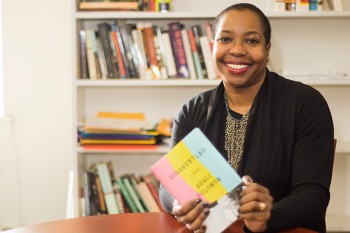Asali Solomon's "Disgruntled" Explores Alienation, Mythologies of Childhood

Photo: Patrick Montero
Details
Haverford College Assistant Professor of English Asali Solomon drew upon her own West Philadelphia childhood for her new book, Disgruntled: A Novel. It tells the tale of 8-year-old Kenya Curtis, who lives in West Philadelphia in the late 1980s. But it was architect Frank Lloyd Wright's infamous servant who was the true inspiration for the tale
Julian Carlton worked for Wright and his mistress, Martha“Mamah” Borthwick, at Taliesen in Wisconsin. In 1914, he set fire to the house and attacked those who tried to escape with an axe. Seven people, including Borthwick and her two children, died. (Wright was away at the time.)
“Something about that story caught my imagination,” Solomon, 42, says.“I think that's where the title Disgruntled came from.
“I knew I wanted to write something about the idea of being disgruntled,” she says. Her protagonist is alienated from her neighborhood friends because of her Afro-centric, nationalist upbringing—echoing Solomon's own childhood. Later, Kenya attends a private school on the Main Line —Solomon went to the Baldwin School from fourth to eighth grade—and continues to feel an outsider because of socio-economics and race.
Carlton's story, she says, became a way to think about Kenya's experiences of alienation.“It's not rage, but suppressed rage becoming alienation,” she says.
It also exposes what she calls the mythologies of childhood.“The thing about being young is that you don't know the world is not really waiting to embrace you,” she says.“You know, a lot of time the world at best is indifferent and at worst actively hostile.”
Yet, many people recall only an idyllic youth.“They hold on to this fantasy that childhood is this place of safety and love and no danger or no threat,” Solomon says.
“I think being a child is hard in a way that being an adult is hard. I didn't have a bad childhood, but I was aware of dangers and difficulties that my parents had no control over. That's one of the shocking realizations. Even though parents control your world, they don't control the world.”
How much of the novel is autobiographical?“Anything interesting or dramatic that happens in this book didn't happen to me,” she says.
In a review, the Los Angeles Times writes that Disgruntled is“a smart, philosophical, coming-of-age tale featuring a vivid protagonist who battles `the shame of being alive.'” It calls Solomon“a masterful writer … who presents beauty and complex ideas in clear, accessible prose.”
Solomon has long explored racial dynamics, including in her first book, Get Down (2006). The collection of coming-of-age short stories, also set in 1980s Philadelphia, often focuses on black girls from the city attending suburban, private schools.
But in both her books, Solomon also delves deeply into the less told experiences of “intra-racial dynamics, so relationships that black people have with each other that go across class within those communities, or lifestyle, or division of color within the black community,” she says. Readers, she hopes, will relate to the Main Line middle school dances and the role of race in who gets asked to dance by the black boys. Or the pull of Southern mythologies. (Kenya's mother is obsessed with Gone With the Wind.)
Disgruntled, Solomon says, is by no means a treatise. The thought-provoking story that was germinating for years also has plenty of humorous moments as it captures quirky behaviors and social life and culture in a moment in Philadelphia's past, pre-gentrification.
The older of two sisters, Solomon was an avid reader (The Chronicles of Narnia and anything Toni Morrison) who enjoyed writing, composing her first book at age four. (It was about mice, she says.) Her father, retired from the Social Security Administration, has long composed songs. Her mother works as an advocate for public education.
The Central High School graduate went to Barnard College, where she got a degree in Pan-African Studies in 1995. In 2002, she received her doctorate in English from the University of California, Berkeley, and then earned an MFA in 2004 from the University of Iowa, attending its famed Writers Workshop.
After teaching stints that included Washington and Lee University and Trinity College, Solomon followed her husband, Assistant Professor of History Andrew Friedman, to Haverford College as a visiting professor in the English department. Over the summer, she received a tenure-track appointment and teaches literature and creative writing.
Solomon has plans for another novel. It will, she says, pay homage to Virginia Woolfe's Mrs Dalloway and revolve around a fateful dinner party.
“I don't want to say anymore than that,” says Solomon.
—Lini S. Kadaba



